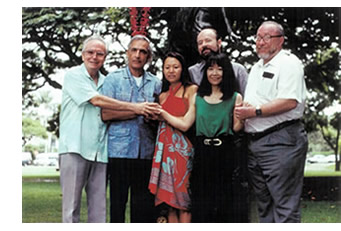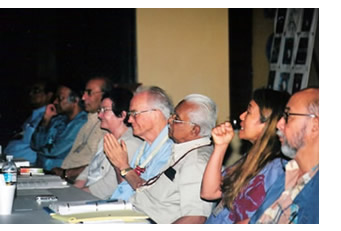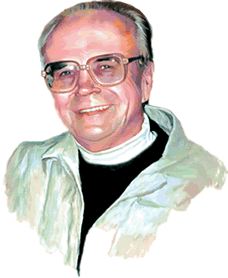
Background
Brief History
In 1988 the Center for Global Nonviolence Planning Project was established by Professor Glenn Paige as an exploratory initiative in the Spark M. Matsunaga Institute of Peace, College of Social Sciences at the University of Hawai‘i. Its purpose was to be a creative facilitator of research, education-training, and action in the form of problem-solving leadership for nonviolent global transformation. The Center pursued discovering and sharing nonviolent spiritual, scientific, skills, and artistic resources through cooperation with individuals and institutions throughout the world, and by assisting the global emergence of nonviolent leadership and citizen competence. The Center also produced a number of publications and convened and participated in leadership conferences around the world.
 In 2002, Professor Paige published Nonkilling Global Political Science. The nonkilling research findings of the book, of which translations to over 30 languages have been completed or are currently in progress, have become the basis for curricula, on-the-ground advocacy, and affiliate centers in some of the most killing-prone places in the world. This book was published the same year as, and complements, the unprecedented World Health Organization (WHO) World Report on Violence and Health (2002) which concludes that human violence (including suicide, homicide, and war) is a “preventable disease.” These publications were significant contributions to the growing literature on issues, research and initiatives related to reducing or eliminating killing from various causes, and in various places, around the world.
In 2002, Professor Paige published Nonkilling Global Political Science. The nonkilling research findings of the book, of which translations to over 30 languages have been completed or are currently in progress, have become the basis for curricula, on-the-ground advocacy, and affiliate centers in some of the most killing-prone places in the world. This book was published the same year as, and complements, the unprecedented World Health Organization (WHO) World Report on Violence and Health (2002) which concludes that human violence (including suicide, homicide, and war) is a “preventable disease.” These publications were significant contributions to the growing literature on issues, research and initiatives related to reducing or eliminating killing from various causes, and in various places, around the world.
In November 2007 the Center organized and convened the “First Global Nonkilling Leadership Forum”. A major outcome from the Forum was the acknowledged need and demonstrated support for establishing a successor Center for Global Nonkilling, along with an associated Global Nonkilling Leadership Academy. Nobel Peace Laureate Mairead Corrigan Maguire co-chaired the Forum with retired Canadian science diplomat and Department of Peace advocate Dr. Bill Bhaneja. The Forum was attended by 30 participants from 20 countries.
Immediately following the Forum, in December 2007, Professor Paige and CGNV Secretary Glenda Paige attended the 8th World Summit of Nobel Peace Laureates in Rome, where the Peace Laureates proclaimed a “Charter for a World without Violence“. A significant result from the meeting was the addition of a thirteenth principle to the Charter, drafted at the request of Nobel Laureate Mairead Maguire, that calls upon all “to work together towards a just, killing-free world in which everyone has the right not to be killed and the responsibility not to kill others.”
 Early in 2008, Humanity United provided a grant to CGNV to conduct a six-month strategic planning process. This process resulted in an organizational development plan for the Center for Global Nonkilling. This provided Humanity United with the basis for evaluating the potential structure, mission and strategies of the new Center, and its likelihood of success.
Early in 2008, Humanity United provided a grant to CGNV to conduct a six-month strategic planning process. This process resulted in an organizational development plan for the Center for Global Nonkilling. This provided Humanity United with the basis for evaluating the potential structure, mission and strategies of the new Center, and its likelihood of success.
A five person planning team, led by Greg Bourne, Karen Cross* and Tom Fee, with Glenn Paige* and Glenda Paige* (*existing CGNV Board members) worked closely to develop the organizational plan. Three joint working sessions were held in Honolulu, and four international colleagues joined the second session to contribute their perspectives to the planning process.
Based on this plan, Humanity United then provided a much larger one-year grant in December 2008 to help establish CGNK. The grant enabled CGNK to hire, at least part time, all members of the proposed Leadership Team for the expressed purpose of demonstrating the value that can be added by CGNK to numerous other efforts around the world to stop killing and create societies open to infinite creativity in responding to human needs and aspirations.
During the last quarter of 2008, after the indication of pending funding from Humanity United, CGNV proceeded with officially changing the name of the existing 501(c)3 from the Center for Global Nonviolence to the Center for Global Nonkilling. In addition, legal consultants were hired to update both the By-Laws and Articles of Incorporation for the 501(c)3 and steps for the transition from CGNV to CGNK, such as establishing a new Governing Council, were put in place.
On December 6, 2008, the CGNV Board held its final meeting, adopting a slate of new Governing Council members, as well as providing provisional approval of several important administrative and financial policies for the operation of the new organization. The two co-directors were officially hired by the outgoing Board for a period one year, and the new co-directors then officially hired the remainder of the Leadership Team on one-year appointments.
Founder
Professor Glenn D. Paige
 The journey from soldier to scholar to founder with others of the Center for Global Nonkilling can be told in terms of three discoveries.
The journey from soldier to scholar to founder with others of the Center for Global Nonkilling can be told in terms of three discoveries.
The first began with a case study with interviews of how President Harry S Truman and other leaders engaged the United States in the Korean War in which Paige had served during 1950-52. This became a doctoral dissertation published as a book The Korean Decision: June 24-30, 1950 (1968).
Subsequent comparative study of divided Korea’s divergent development since 1945 led to discovery of the creative potential of political leadership for social change and a call to make this a special field for research, teaching, and service in the academic discipline of political science. This was published in The Scientific Study of Political Leadership (1977).
The second discovery was of nonkilling as a basic value for political science and life. In 1974, blocked in peacemaking efforts to bring North Korean scholars to visit the University of Hawai‘i, Paige experienced a sudden transformational awakening that came in three silent words, “No more killing!”
This led to a critical book review by him of his book on the Korean War, which essentially had been a scientific apologia for war. This was published as “On Values and Science: The Korean Decision Reconsidered” in the American Political Science Review (December 1977). Such an author review was unprecedented in the history of the APSR since 1906.
The third discovery followed projection of the logic of nonviolent critical analysis applied to his own scientific work to critique the violence-accepting assumptions of the discipline of political science as a whole. After 28 years of research, teaching, and travel to discover foundations for a new nonkilling discipline the results were published as Nonkilling Global Political Science (2002; 3rd ed. 2009).
By 2009 the book was being translated into 34 languages and had led to convening the First Global Nonkilling Leadership Forum in Honolulu, November 1-4, 2007. Proceedings are published in Global Nonkilling Leadership (2009).
The Global Forum led to visionary support by the humanitarian foundation Humanity United to transform the nonprofit Center for Global Nonviolence founded by Paige and others in 1994 (with affiliates in Haiti, Nigeria, and Great Lakes Africa) into a unique Center for Global Nonkilling (2008 – ). This startup support enables a Leadership Team of seven workers, including two co-directors, to begin to demonstrate capability—in worldwide cooperation with individuals, organizations, and institutions— to carry out the CGNK’s mission “to promote change toward the measurable goal of a killing-free world.”
Every step on the journey of the founder from war to chair of the Governing Council of the Center for Global Nonkilling has been made possible by inspiration and support of others at home and from throughout the world. Chief among them is assistance in every aspect of work since 1973 of his wife Glenda Hatsuko (Naito) Paige. Inadequate acknowledgement to all is expressed in the publications that mark the discoveries of the journey.
The son of a YMCA social worker, Glenn Durland Paige was born on June 28, 1929 in Brockton, Massachusetts, in the northeastern part of the United States known as New England. He grew up in Rochester, New Hampshire, with summers in Provincetown, Cape Cod, Massachusetts. He served in the U.S. Army (1948-52). He is a graduate of Phillips Exeter Academy (1947), Princeton University (A.B., politics, 1955), Harvard University (A.M., East Asian regional studies, 1957) and Northwestern University (Ph.D. political science, 1959). After teaching at Seoul National University (1959-61), and Princeton University (1961-67), he taught at the University of Hawai‘i (1967-92). He has lived in Honolulu since 1967 and has benefited from kindness of others in travel to more than thirty countries.
Glenn D. Paige’s drawing is the work of “Sona & Jacob” (India). © Copyright HWK-Verlag, Germany.
The text on this page is under GNU Free Documentation License. Visit Wikipedia for an updated biographic account.
Our Logo
In the circle of the Universe, creative transformational initiatives (blue), drawing upon nonkilling human capabilities (white), work to end human killing (red).

Documents
First Global Nonkilling Leadership Forum Documents
- Download “Affirmation of the Global Nonkilling Spirit (original copy with signatures)” SIGNATURES.pdf – Downloaded 4006 times – 124.13 KB
- Download “For a Nonkilling World (Report of the First Global Nonkilling Leadership Forum)” forum2007.pdf – Downloaded 2573 times – 523.81 KB
- Download “Global Nonkilling Leadership Forum Book of Proceedings” forum1.pdf – Downloaded 5926 times – 2.03 MB
Center for Global Nonviolence (1988-2008) Documents
- Download “State of Hawai’i Senate Peace Day Award (2008)” senate.pdf – Downloaded 2342 times – 519.71 KB
- Download “State of Hawai’i House of Representatives Peace Day Award (2008)” houseglenn.pdf – Downloaded 2251 times – 534.46 KB
- Download “Global Nonkilling Circle of Honor in recognition of Guillermo Gaviria, Yolanda Pinto and Gilberto Echeverri (2004)” circleofhonor.pdf – Downloaded 2671 times – 22.92 KB
- Download “Nobel Peace Prize Nomination for Governor Guillermo Gaviria Correa and First Lady Yolanda Pinto de Gaviria (2003)” nobelnomination.pdf – Downloaded 2903 times – 20.07 KB
The Center for Global Nonkilling has awarded the “Global Nonkilling Circle of Honor” to individuals, organizations and communities who have significanty contributing toward nonkilling transformation, both “In Memoriam” and “In Action”.
The first “Global Nonkilling Circle of Honor” was awarded in 2004 in recognition of Guillermo Gaviria, Yolanda Pinto and Gilberto Echeverri” Download «Global Nonkilling Circle of Honor in recognition of Guillermo Gaviria, Yolanda Pinto and Gilberto Echeverri (2004)» [22.92 KB] .
